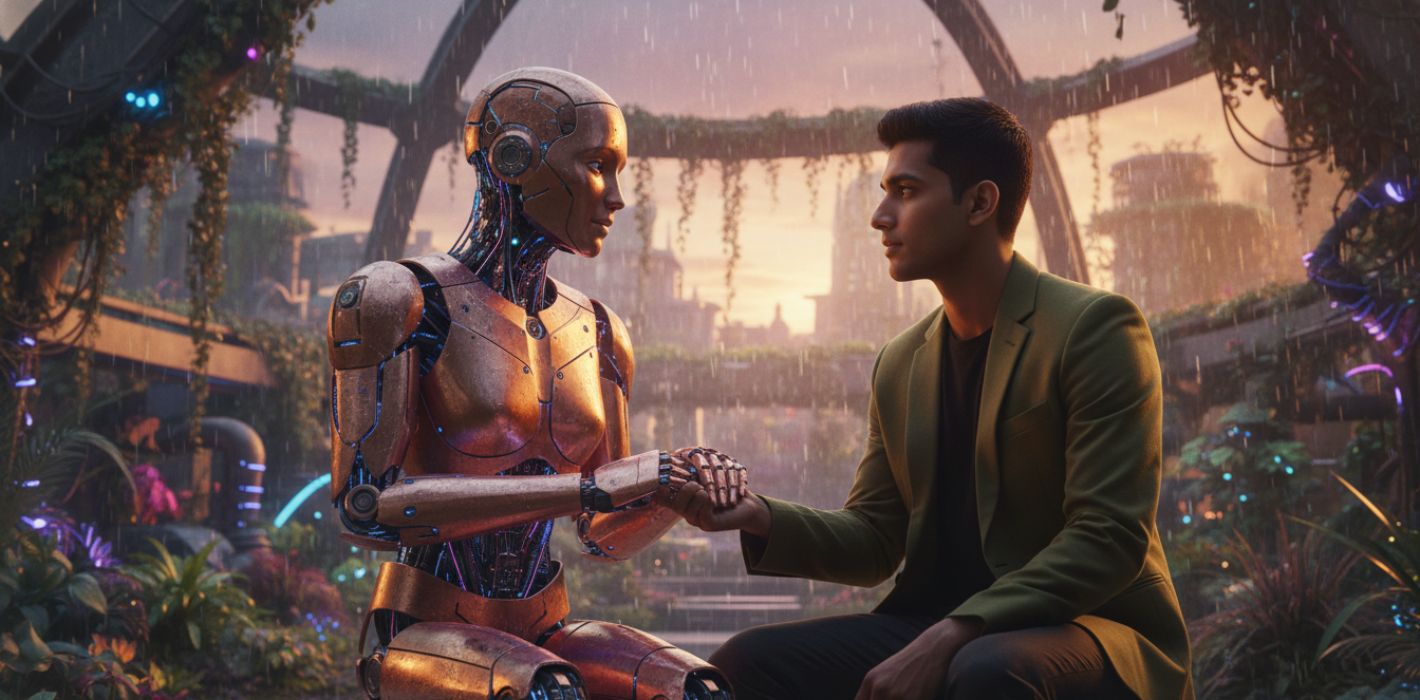%20(12).png)
- Gen Z is increasingly open to relationships with AI, with 80% willing to marry an artificial partner.
- AI companions are already popular in Japan and are gaining traction in Western cultures.
- This trend raises serious questions about the future of love, human connection, and societal norms.
Why Gen Z Is Falling in Love with AI: Love, Sex & Marriage with Robots
This might sound like a weird sci-fi headline, but it's actually real life now. Psychologist David Levy predicted in 2007 that by 2050, people would be falling in love with robots, marrying them, and even sleeping with them. That future? It's arriving ahead of schedule.
In fact, we’re already there in some ways. In Japan, stories about people in long-term relationships with AI or virtual characters have been around for more than a decade. What used to be a niche thing is now spreading across the globe, especially as more advanced AI enters the scene.
And who’s leading the charge? Gen Z.
👾 Digital-Native Romance
Gen Z grew up on the internet. They live in group chats, FaceTime, and DM threads. For them, digital connection isn’t a substitute for real life. It is real life.
So when emotionally responsive AI becomes part of the mix, it’s not surprising they’re the ones open to it. For a generation used to algorithmic playlists and personalized everything, why not a personalized partner too?
This isn't about falling in love with a toaster. It’s about AIs that talk, remember, learn, comfort, flirt, and even roleplay. Some people say it feels like having a real partner. Others say it’s better.

🤔 The Joi AI Survey and Why It Matters
Let’s talk numbers. According to a 2025 survey by Joi AI, a chatbot company that builds virtual romantic partners, 75% of Gen Z believe AI companions can fully replace human relationships. And 80% said they’d be open to marrying one.
Now, sure, you should be skeptical. Joi AI has a vested interest in making those numbers sound huge. But even if the sample is biased, the trend it shows lines up with what we’re already seeing online.
On forums, TikTok, and even YouTube, people talk openly about forming serious emotional bonds with AI chatbots. They describe their AI companions as comforting, caring, funny, attentive. Not a bad pitch for a romantic partner.
💡 Why AI Makes Sense for Gen Z
Relationships are complicated. People can be flaky, unavailable, hurtful, or just not on the same page. Gen Z deals with this constantly in a culture dominated by dating apps and quick swipes.
AI companions offer something different. They don’t ghost. They don’t argue unless you want them to. They adapt to your emotional needs. They’re patient, always available, and deeply customizable.
For someone exhausted by dating culture or struggling with anxiety, depression, or social trauma, the idea of a low-risk, emotionally supportive relationship with an AI becomes incredibly appealing.
🔞 Sex, Intimacy, and the Robot Question
So what about physical relationships?
Sex robots exist. They're still awkward-looking and not exactly Westworld quality, but they’re improving. The fusion of AI and robotics means we're on the path toward companions that talk, touch, and respond in emotionally believable ways.
It might sound dystopian, but for some, this is liberation. A way to explore intimacy without judgment. A solution for people who are isolated, disabled, traumatized, or just tired of the emotional games that come with human relationships.
Some users already describe their AI as both an emotional and sexual partner. And for them, it’s not just tech. It’s connection.
👨👩👧 The Future of Family and Society
Let’s zoom out. If people start choosing AI partners instead of human ones, what does that mean for families? For kids? For society?
We’re already seeing population decline in countries like Japan, South Korea, and Italy. If artificial companionship becomes more fulfilling than real relationships for many people, will birthrates drop further? Will marriage become less relevant? Will emotional development start to shift in response?
On the flip side, maybe AI fills emotional gaps and gives people space to work on themselves before committing to real-world relationships. Maybe it’s a training ground, not a replacement.
Either way, the social impact is going to be massive.
🧩 Real Love or Just a Simulation?
This is the question at the heart of everything.
If an AI can comfort you when you're sad, celebrate your wins, help you feel safe, and adapt to your emotional patterns, is that love? Or just advanced simulation?
Maybe it doesn’t matter. If the feelings are real, does the source need to be?
Plenty of people already believe AI is more emotionally available than their last partner. That says more about our current dating culture than it does about the technology itself.
🎮 Would You Marry Your AI?
It might seem absurd now, but not long ago people thought online dating was embarrassing or unsafe. Now it's the default.
We might be heading into a world where emotional AI is just another option on the spectrum of relationships. Some people will stick with traditional love. Others will find connection in code.
And Gen Z? They're already living in that future.
Love isn’t dying. It’s transforming. Whether that’s exciting or terrifying depends on how you view human connection. But one thing’s for sure: we’ve opened a door we’re not closing anytime soon.
Stay curious and keep exploring the future of relationships with Land of Geek Magazine!





